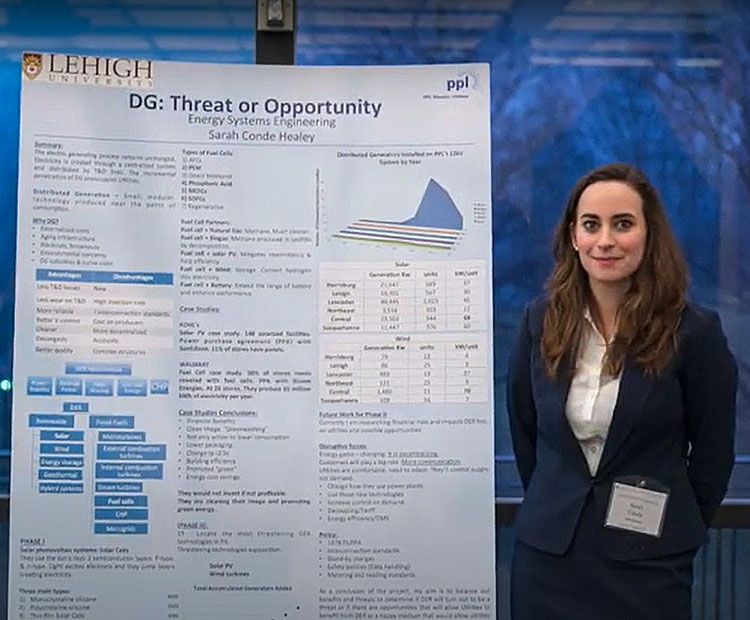Lehigh’s Energy Systems Engineering master’s program helped environmental engineer Sarah Conde ’15 M.Eng. flip the switch on new career with commercial solar developer
When the zombie apocalypse hits the Los Angeles area in the Netflix series “Daybreak,” a teenager observes that a local shopping mall keeps running because it’s solar powered.
Sarah Conde, a graduate of Lehigh University’s Energy Systems Engineering (ESE) professional master’s degree program, relishes that reference of art imitating life.
“I was like, ‘Ha! We did that!’” recalls Conde, who is director of estimating and procurement for Safari Energy, a solar energy subsidiary of PPL Corporation.
Safari recently managed system design, permitting, and construction for a large-scale solar project at the Westfield Topanga & The Village mall parking deck in California’s San Fernando Valley. The addition of about 9,000 panels to an existing set made news in 2018 for giving the mall facilities the largest solar array of any retail center in California. The solar panels—nearly 15,000 in total—reduce annual carbon dioxide emissions by more than 4,900 metric tons, or the equivalent of removing a thousand cars from the roads.
That’s the kind of impact Conde was hoping to make when she applied to Lehigh’s intensive 10-month, 30-credit ESE program in the P.C. Rossin College of Engineering and Applied Science.
Born and raised in Spain, Conde graduated from the University of Barcelona with a degree in environmental engineering. She was working for a wastewater treatment company in Barcelona when she decided she wanted to learn more about solar and renewable energy. Conde was accepted to the ESE program in 2014 and graduated May 2015. Two weeks later, she started working for Safari Energy in New York City.
The ESE program gave Conde a broad understanding of the energy field while allowing her to specialize in the areas in which she was most interested: solar power and renewable energy.
One of her favorite courses was the Fundamentals of Energy Efficiency Practicum, where students work with Lehigh’s Industrial Assessment Center to conduct energy audits at area businesses, showing them how to save energy, reduce waste, and improve productivity. The center has worked with about 350 firms since opening in 1998, saving companies millions of dollars. Conde learned a lot by visiting work sites, determining viable energy-saving techniques, and conveying those recommendations in audit reports.
“I was in all these buildings, taking measurements and figuring out solutions for energy efficiency,” she explains. In her current role, she uses those skills, as well as knowledge she gained in Lehigh’s courses on solar energy, to do the estimating, budgeting, procurement, and some of the permitting for Safari’s commercial real estate solar projects.
“We’ve done solar systems all over the U.S.,” Conde says.
She also credits the ESE program with teaching more than science and engineering. Conde says she came away with a better handle on communicating technical information in ways people from different backgrounds can understand.
“Costs and benefits are things a lot of people present wrong,” she says, explaining that slides full of text don’t resonate as well as images. “That’s something that you learn early on at Lehigh: Less is more. Visual is better.”
Lehigh faculty emphasized being prepared and doing quality work using proper information and sources. Her professors also brought in professionals from different energy fields to give students insight into possible careers and help them network.
“We were able to talk to a lot of people and get a lot of feedback from experienced professionals who have been doing energy-related business for a long time,” she says. “We were pretty well rounded when we walked out of there.”
Knowing that her work is helping the environment gives Conde great satisfaction: “It’s very important to be more conscious about the world we live in and what we’re leaving behind.”
—Margie Peterson is a freelance contributor for the P.C. Rossin College of Engineering and Applied Science

